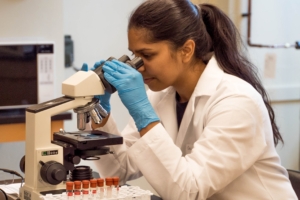DSIT Transforming Foreign Aid from the UK
 From the steam engine to the World Wide Web, the U.K. has long been a scientific pioneer. Now, Rishi Sunak’s government is determined to secure the U.K.’s place as a “science and technology superpower by 2030.” In doing so, he could also help transform foreign aid from the U.K.
From the steam engine to the World Wide Web, the U.K. has long been a scientific pioneer. Now, Rishi Sunak’s government is determined to secure the U.K.’s place as a “science and technology superpower by 2030.” In doing so, he could also help transform foreign aid from the U.K.
In a bid to secure scientific-superpower status, Sunak created the brand new Department for Science, Innovation and Technology (DSIT) in February 2023. He has already committed up to £3.5 billion to the department.
A recent DSIT policy paper outlines how the international outlook of this new department, gives the U.K. scope to “shape the global landscape.” Specifically, it mentions prioritizing “research and development in the Official Development Assistance (ODA) budget”.
DSIT’s partnership with ODA could prove transformative to the U.K. foreign aid approach. What is more, rethinking the role of science in ODA might be an opportunity to achieve more by spending less.
With this in mind, here are three ways DSIT is looking to transform foreign aid from the U.K.:
- Building Bridges with the Developing World: DSIT’s policy paper also emphasized its plan to “facilitate long-term research and infrastructure partnerships.” In concrete terms, this means establishing good relationships with scientists all over the world, including the developing world. Accordingly, the Director of the Institute of Development Studies, Melissa Leach, said that the new department could help combine the U.K.’s funds and scientific know-how with the “lived experience” of local scientists of low-income countries. These deepened relationships could, therefore, be a catalyst for providing better solutions to poverty problems. Leach points to the containment of Ebola outbreaks in Uganda as proof that building a science-based relationship works. In this instance, Ugandan social scientists worked with British epidemiologists to come up with effective policy ideas to help contain Ebola among gatherings of friends and family. These initiatives not only help countries like Uganda but helps the U.K. too. As the DSIT policy paper recognizes, “expanding the U.K.’s network of Tech Envoys” can help “build our diplomatic network”. In other words, building scientific bridges could be a boost to the U.K.’s soft power.
- Innovating Poverty Action: Foreign aid from the U.K. does not just have to be about giving money. In fact, at a time when the U.K. government is downsizing foreign aid budgets, it is crucial to find other ways to help low-income countries. The Tony Blair Institute for Global Change suggests that one such way could be through DSIT sharing scientific research. Using these “new diplomatic networks”, the U.K. could share its science to the advantage of developing countries. For instance, as a leader in gene editing, this could include sharing scientific knowledge on how to increase crop resistance in severe weather conditions – an especially vital issue in today’s climate crisis.
- Speeding up the Transition to Net Zero: Dr. Emily Grossman, bestselling science author and co-founder of Scientists for Extinction Rebellion, told the Independent that this new Science Department could be a key opportunity for the U.K. to wean itself off of fossil fuels. Grossman not only said the department could spearhead clean energy innovations, but also plug the “greens skill gap.” She said, “We currently don’t have enough people trained in the relevant skills needed for a new ‘green economy’. For example, plumbers who can install heat pumps.” DSIT could help train British personnel. This matters because the U.K. is currently the second-highest greenhouse gas emitter in Europe. Hence, strong climate action from the U.K. could go a long way in fighting climate change, an issue that has more negative effects on impoverished countries and communities.
Overall, the creation of DSIT presents exciting opportunities for Britain and the U.K.’s foreign aid efforts. Its future actions could also demonstrate how domestic government policies on science can help tackle poverty internationally.
– Sam Rucker
Photo: Unsplash
